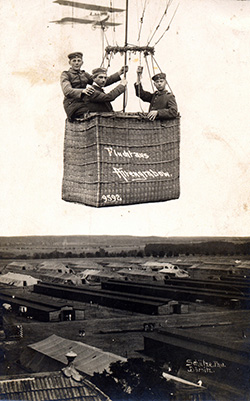Catching fleeting moments that might normally pass by unremarked in the great whirl of everyday life is the writer’s mission, and one that is especially enlivened by the tabula rasa of a foreign country where one is cut off from familiar signals bleeped forth from the mothership.
The two talented non-fiction writers I asked to contribute to Guernica’s current issue were both my students at Columbia University’s excellent School of the Arts MFA program. Both have strong American roots but have lived for extended periods of time in another country.

Tara Bray Smith’s enthusiastically received memoir, West of Then: A Mother, a Daughter, and a Journey Past Paradise, about growing up in Hawaii, is courageous, clear-eyed, generous, and especially valuable for its small-bore perceptions about her chaotic family life, as well as for the breadth of its grasp of Hawaiian history and rich descriptions of landscape. Several years ago, she married the German photographer Thomas Struth and moved to Germany. Her reflections in the current issue register the shocks and perplexities of life in her adopted country and demonstrate the verve and complexity that always characterize her work. Her essays have appeared in Granta and WSJ magazine, and in the anthology State: a Panoramic Portrait of America. She lives with her husband in Berlin and is currently working on a novel set there.
Caleb Daniloff was a shy boy of eleven in 1981 when his father, a journalist, was assigned to Moscow (Nicholas Daniloff would later be jailed by the Soviets on a trumped-up espionage charge), and the family moved there from Washington, D.C. Instead of joining the protected world of many expatriate American boys, Caleb opted to attend a Soviet school and Soviet Pioneer Camp and quickly adopted the habits of his new little socialist thuglet friends—smoking, spitting, cursing, binge-drinking, black-marketeering, and developing a taste for Abba and Soviet death-metal. But strange as his Moscow life may have been, his Guernica essay makes clear how much weirder he found life among the New England boarding school boys he encountered after his family was deported. Caleb’s searingly honest, graceful essays have appeared in the Boston Phoenix, the Boston Globe, The Vermont Quarterly, and the Rutland Herald. He was the 2005 recipient of the Ralph Nading Hill Jr. Literary Prize.
The essay I’ve contributed grew out of my travels to East and West Jerusalem and the West Bank, where I’ve been gathering material for a book. The genesis of the idea of writing the book came indirectly from a trip to Greece, where I passed by many of the conquered cities mentioned in Thucydides’s The Peloponnesian War—a book I teach. Over and over, in Thucydides, one comes across the phrase “and they laid waste the land,” that is, killed all the men and took away as slaves the women and children. There is nothing like seeing a place in its full vitality, humming with its citizens’ well-established capacity for enjoying life, that can more fully bring home the true meaning of war. And despite the thousand-and-one newspaper articles and CNN clips about the Israeli-Palestinian conflict, the everyday devastations of war are, I believe, inadequately portrayed and are best viewed from close proximity.
 Lis Harris is a former staff writer for The New Yorker magazine and a Professor of Writing at Columbia University’s Graduate School of the Arts. She is currently working on a book about a hundred years in the life of an Israeli and a Palestinian family.
Lis Harris is a former staff writer for The New Yorker magazine and a Professor of Writing at Columbia University’s Graduate School of the Arts. She is currently working on a book about a hundred years in the life of an Israeli and a Palestinian family.
Author photo by Joyce Ravid
Vintage postcard courtesy of Drake Goodman via Flickr.

